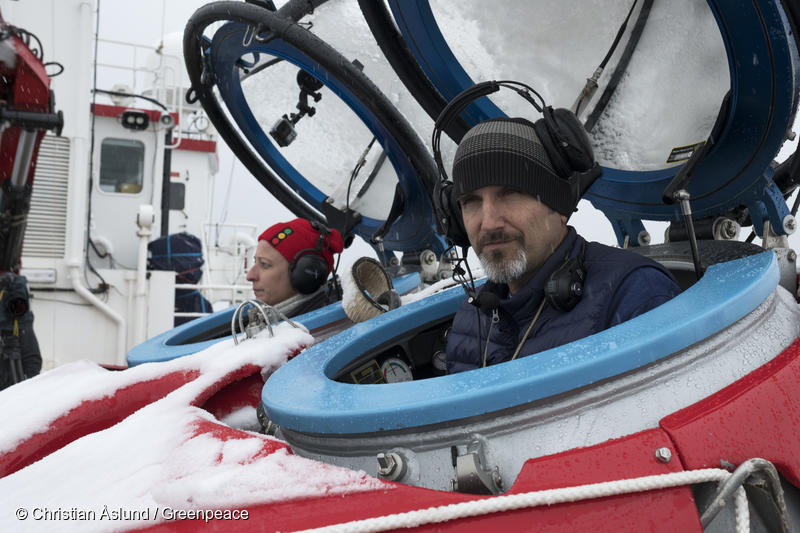
Katie Camosy, senior visual producer, recently interviewed John Hocevar, Oceans Campaign Director, about the challenges of science communication and the Netflix movie, Don’t Look Up.
What do you think of Don’t Look Up?
Don’t Look Up is a parable for our times. Despite the fires and floods, droughts and hurricanes, and steadily rising temperatures and sea levels, many Americans have opted to pretend everything is normal. Nothing to see here! But the meteor is here, whether or not we dare to look up at it. Just like in the film, our chance to do anything to save ourselves shrinks the longer we fail to act. I love that the film is provoking so much discussion. It’s a reminder of the power of art and film, and hopefully an example that shows Hollywood that people are hungry for movies that can help us make sense of the times we are living in.
I loved Mark Rylance’s role as Peter Isherwell, the tech billionaire savior who was really just in it for himself. Industry works hard to convince us that it’s fine to carry on as we are because new tech fixes are right around the corner. They are not. The answers are well understood, and start with shifting from oil, coal, and gas to renewable energy sources. We need to invest in public transportation and regenerative agriculture, and reduce meat consumption. This is going to take some help from all of us, but the big changes require action from governments and corporations. When you realize that just 100 companies are responsible for 71% of climate change, you know where to focus your efforts.
When the world has gone mad, it is hard to produce a satire that doesn’t feel like a documentary. There are actually companies, like the Metals Company and Lockheed Martin, that want to mine the deep sea for metals to use in batteries — as if destroying the ocean were a sensible way to fight climate change!

Dr. Susanne Lockhart, Antarctic biologist, and submarine pilot John Hocevar, Director of Oceans for Greenpeace USA sitting in a two person submarine about to be launched from Greenpeace ship, Arctic Sunrise.
In what ways do you relate to the scientist characters, Dr. Randall Mindy and Kate Dibiasky? Have you had similarly frustrating experiences when speaking with politicians or the media?
Many of the scientists I know relate to the astronomers in Don’t Look Up. I engage with a large community of coral reef scientists, and all of them understand that climate change is killing coral reefs on a global scale. Imagine knowing that the focus of your life’s work is disappearing — and feeling like if you could just make politicians understand, you could turn things around!
Scientists have a reputation for being unable or unwilling to speak clearly about the implications of their research. When it comes to climate change, though, that is starting to change quickly.
When the people that best understand what is happening are the most alarmed, we’d better pay attention.
About 15 years ago, I lived in Texas, where I had some truly awful meetings with congressional offices about climate change. I remember one guy saying the best thing we could do for the climate would be to build more roads, so cars wouldn’t be stuck in traffic. For most Republican and some Democrat politicians, that view hasn’t evolved much — even as the climate change meteor has started to hit home for so many of us.
Did you feel any catharsis watching these scenes depicted in a movie?
I loved seeing the president get eaten alive.
Towards the end, when they sit down for the last dinner before the world ends, Kate says “I’m glad we tried.” That was an emotional moment for me, and probably for all of us who fight for a livable future that we can’t always believe in. I also loved Randall’s last line: “we really had it all, didn’t we?”
What are some of the challenges around science communication?
In scientific research, there is always a level of uncertainty, even when the data is absolutely clear. Scientists often feel a need to add caveats that make it sound like they are less sure than they are, which enables industry to pretend the findings are in doubt. Publicity is pretty scary for many scientists, because their work and their institutions are often funded by industry. When the fishing industry gives millions of dollars to your program, you are going to be very careful about how you talk about the impacts of industrial fishing. Even worse, industry funding often influences the kinds of questions scientists try to answer, creating dangerous gaps in our understanding.
Why do you think people are so eager to talk about Don’t Look Up?
Most of us understand that climate change is a huge threat that must be dealt with immediately. It is scary and overwhelming, so it feels like a relief when a film like this creates an opportunity for us to talk about it.
Anything else you’d like to add?
Scientists can identify problems and propose solutions, but it is up to all of us to make sure politicians and corporations take action.
Ready to join the fight?
We need your help to demand action from our leaders. Send a message to Congress: support a Green New Deal, and let’s imagine a world beyond oil!
